Supreme Court asked to void Louisiana abortion clinic law
Legal Events
A Louisiana abortion clinic is asking the Supreme Court to strike down regulations that could leave the state with just one clinic.
A divided high court had previously agreed to block the law pending a full review of the case.
An appeal being filed with the court Wednesday says the justices should now take the next step and declare the law an unconstitutional burden on the rights of women seeking an abortion. The Louisiana provision is similar to a Texas law the court struck down in 2016.
If the justices agree to hear the Louisiana case, as seems likely, it could lead to a decision on the high-profile abortion issue in spring 2020, in the midst of the presidential election campaign.
The case presents a swirling mix of the changed court’s views on abortion rights and its respect for earlier high court decisions.
Louisiana’s law requires abortion providers to have admitting privileges at nearby hospitals. The justices said in 2016 that a Texas law provided “few, if any, health benefits for women.”
But the composition of the court has changed since then. President Donald Trump has put two justices, Neil Gorsuch and Brett Kavanaugh, on the court. Kavanaugh replaced Justice Anthony Kennedy, who voted to strike down the Texas law. Trump had pledged during the campaign to appoint “pro-life” justices, and abortion opponents are hoping the more conservative bench will be more open to upholding abortion restrictions.
Louisiana abortion providers and a district judge who initially heard the case said one or maybe two of the state’s three abortion clinics would have to close under the new law. There would be at most two doctors who could meet its requirements, they said.
But the appeals court in New Orleans rejected those claims, doubting that any clinics would have to close and saying the doctors had not tried hard enough to establish relationships with local hospitals.
In January, the full appeals court voted 9-6 not to get involved in the case, setting up the Supreme Court appeal.
In February, the justices split 5-4 to keep the law on hold. Chief Justice John Roberts, a dissenter in the 2016 case from Texas, joined with the court’s four liberal justices to temporarily block the Louisiana measure.
Related listings
-
Ohio Republicans defending state congressional map in court
Legal Events 03/10/2019Attorneys for Ohio Republican officials will call witnesses this week to defend the state's congressional map.A federal trial enters its second week Monday in a lawsuit by voter rights groups that say the current seats resulted from "an unconstitutio...
-
Dakota Access developer sues Greenpeace in state court
Legal Events 02/23/2019The developer of the Dakota Access oil pipeline is going after the environmental group Greenpeace in state court in North Dakota, after a judge tossed the company's $1 billion racketeering claim out of federal court.Texas-based Energy Transfer Partne...
-
Kenya court postpones ruling on anti-gay laws to May 24
Legal Events 02/22/2019A Kenyan court Friday postponed a ruling on whether to decriminalize same sex relationships, disappointing many in the country's LGBT community.The ruling will not be made until May 24 because some judges had been busy, Justice Chaacha Mwita of the H...

Grounds for Divorce in Ohio - Sylkatis Law, LLC
A divorce in Ohio is filed when there is typically “fault” by one of the parties and party not at “fault” seeks to end the marriage. A court in Ohio may grant a divorce for the following reasons:
• Willful absence of the adverse party for one year
• Adultery
• Extreme cruelty
• Fraudulent contract
• Any gross neglect of duty
• Habitual drunkenness
• Imprisonment in a correctional institution at the time of filing the complaint
• Procurement of a divorce outside this state by the other party
Additionally, there are two “no-fault” basis for which a court may grant a divorce:
• When the parties have, without interruption for one year, lived separate and apart without cohabitation
• Incompatibility, unless denied by either party
However, whether or not the the court grants the divorce for “fault” or not, in Ohio the party not at “fault” will not get a bigger slice of the marital property.




